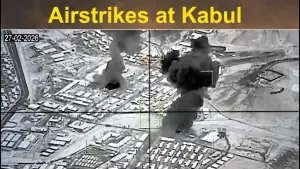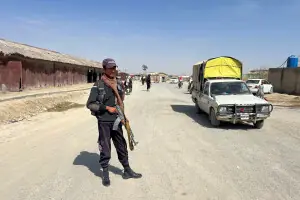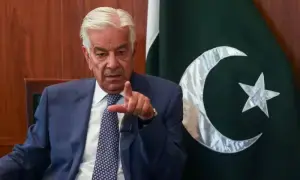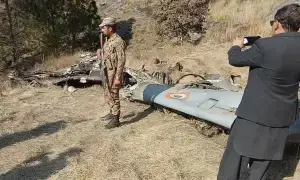India has more nukes than Pakistan now: SIPRI report
4 min readA report by the Stockholm International Peace Research Institute (SIPRI) has shown that countries are continuing to modernise their nuclear capabilities, adding that India now has more weapons than Pakistan.
China has increased its nuclear arsenal from 410 warheads in January 2023 to 500 in January 2024.
SIPRI found that there are nine nuclear-armed nations, including India, Pakistan, China, the United States, Russia, the United Kingdom, France, North Korea and Israel.
“While Pakistan remains the main focus of India’s nuclear deterrent, India appears to be placing growing emphasis on longer-range weapons, including those capable of reaching targets throughout China,” the report said.
The report pointed out that India, Pakistan, and North Korea were following Russia’s footsteps in weapons attainment.
The report claimed India marginally expanded its nuclear arsenal in 2023.
The world’s nine nuclear-armed states jointly spent $91 billion on their arsenals last year, according to a new report from the International Campaign to Abolish Nuclear Weapons (ICAN).
“I think it is fair to say there is a nuclear arms race under way,” ICAN chief Melissa Parke told AFP.
Wilfred Wan, head of SIPRI’s weapons of mass destruction programme, meanwhile warned in a statement that “we have not seen nuclear weapons playing such a prominent role in international relations since the Cold War”.
SIPRI’s report showed that the total estimated number of nuclear warheads in the world actually declined somewhat to 12,121 at the start of this year, from 12,512 a year earlier.
But while some of that included older warheads scheduled to be dismantled, it said 9,585 were in stockpiles for potential use — nine more than a year earlier.
And 2,100 were kept in a state of “high operational alert” on ballistic missiles. Nearly all of those were held by the United States and Russia, but China was for the first time believed to also have some warheads on high operational alert, SIPRI said.
“While the global total of nuclear warheads continues to fall as Cold War-era weapons are gradually dismantled, regrettably we continue to see year-on-year increases in the number of operational nuclear warheads,” SIPRI director Dan Smith said.
The spending surge reported by ICAN appeared to back that up.
The report showed that in 2023 alone, nuclear weapons spending worldwide jumped by $10.8 billion from a year earlier, with the United States accounting for 80 percent of that increase.
The US share of total spending, $51.5 billion, “is more than all the other nuclear-armed countries put together”, said ICAN.
The next biggest spender was China, at $11.8 billion, followed by Russia, spending $8.3 billion.
Britain’s spending meanwhile rose significantly for the second year in a row, swelling 17 percent to $8.1 billion.
Spending for 2023 by the nuclear-armed states — which also include France, India, Israel, Pakistan and North Korea — jumped more than 33 percent from the $68.2 billion spent in 2018, when ICAN first began collecting this data, it said.
Since then, the nuclear armed states have spent an estimated total of $387 billion on the deadly weapons, the report showed.
Parke slammed “the billions of dollars being squandered on nuclear weapons” as “a profound and unacceptable misallocation of public funds”.
She highlighted that that money was more than what the World Food Programme estimates is needed to end world hunger.
“And you could plant a million trees for every minute of nuclear weapons spending,” she said.
“These numbers are obscene, and it is money that the state says is going towards weapons that… will never be used,” she said, pointing to the nuclear deterrence doctrine.
The investments are not only wasteful but also extremely dangerous, she warned.
“What happens when deterrence fails?”
Read more
Nuclear arms spending soars as global tensions swell: studies
N. Korea’s Kim calls for ramping up production of ‘weapon-grade nuclear material’
India, Pakistan among countries likely planning nuclear tests: report
Geneva-based ICAN won the 2017 Nobel Peace Prize for its key role in drafting the Treaty on the Prohibition of Nuclear Weapons, which took effect in 2021.
Seventy countries have ratified it to date and more have signed it, although none of the nuclear weapons states have come on board.
“Instead of investing in Armageddon, the nine nuclear-armed states should follow the example of almost half the world’s countries and join the treaty… and make a real contribution to global security,” said Alicia Sanders-Zakre, a co-author of Monday’s ICAN report.
According to the SIPRI report, North Korea currently possesses around 50 nuclear warheads. Furthermore, they are continuing their efforts to develop additional nuclear weapons. Estimates suggest that North Korea has sufficient nuclear material to potentially produce up to 90 nuclear warheads.
According to the SIPRI report, Israel has never openly acknowledged that it possesses nuclear weapons, indicating that Israel is upgrading its plutonium production reactor located in Dimona.
According to the SIPRI report, while Russia and the US collectively possess around 90% of the world’s nuclear warheads, with Russia’s stockpile decreasing slightly and the US remaining steady in 2023, concerns remain about the continued development and potential use of these highly destructive weapons globally.
For the latest news, follow us on Twitter @Aaj_Urdu. We are also on Facebook, Instagram and YouTube.























Comments are closed on this story.